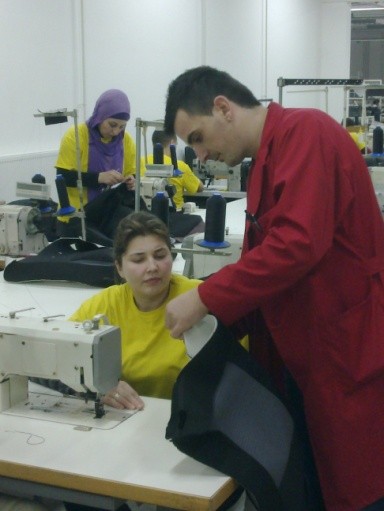
For the first time since graduating from vocational technical high school 10 years ago, Ajdin Dedic has a job as a skilled worker in his hometown of Travnik in Bosnia and Herzegovina.
Dedic, 28, is one of 600 local men and women participating in a USAID-sponsored training program launched in Travnik in 2012. Before the training, Dedic worked odd jobs while looking for work using the vocational skills he learned in high school. Now he oversees an entire department at the town's new Prevent automotive parts factory, making seat covers for Volkswagon.
“I could not find a job in my field for years. I was in the unemployment line, and occasionally worked as a waiter,” Dedic said. “When I heard that a new factory was about to be opened and that it would organize a training program for auto upholstery sewers, I signed up, completed it successfully, and immediately afterwards, I got a job in the Prevent workshop."
Just three months later, Dedic was promoted from his position as auto upholstery sewer to head of the workshop, managing a team of 20 workers. He also became a sewing instructor with a training course for future employees.
"A few months ago, I could not even imagine that I would be this happy, not only with the work I do today, but also with the factory, my colleagues, the way workers are treated here and the working conditions. I am very glad that I am now in a position to pass on my knowledge to others. I myself benefited very much from the training course, where I actually learned to do this job," Dedic said.
The specialized training was made possible through a unique collaboration of USAID’s FIRMA Project (which is co-financed by the Swedish Government agency Sida), local government authorities, employment offices, vocational schools and Prevent. So far, 250 of the 600 participants have completed training and are employed at the factory—and 60 percent of them are women.
USAID, local officials, and Prevent signed a new memorandum of understanding (MOU) in December 2012 to train 600 new workers. With technical support provided by USAID, the stakeholders will provide resources to develop an adult training program to fulfill Prevent’s immediate labor needs, and will adjust the formal vocational school curriculum to ensure that future high school graduates get the skills needed to work for the company, one of Travnik's largest employers.
"It would mean a lot to private entrepreneurs if the educational institutions could educate students that are already skilled to perform specific tasks. The signatories to this MOU have recognized this need and will work together to formalize it systematically," said Prevent Director Sead Kurtagić.
The USAID-Sida FIRMA Project has developed similar forms of public-private cooperation in Tešanj, Goražde, and Kalesija.
The FIRMA Project, which stands for Fostering Interventions for Rapid Market Advancement, supports sustainable economic growth, employment expansion and increased household incomes in Bosnia and Herzegovina in three sectors of the economy—wood and metal processing, and tourism. The five-year project, which runs from September 2009 to September 2014, works through a network of local partners—development agencies, chambers of commerce, business associations and business service providers—to ensure sustainability after the project has ended.







Comment
Make a general inquiry or suggest an improvement.